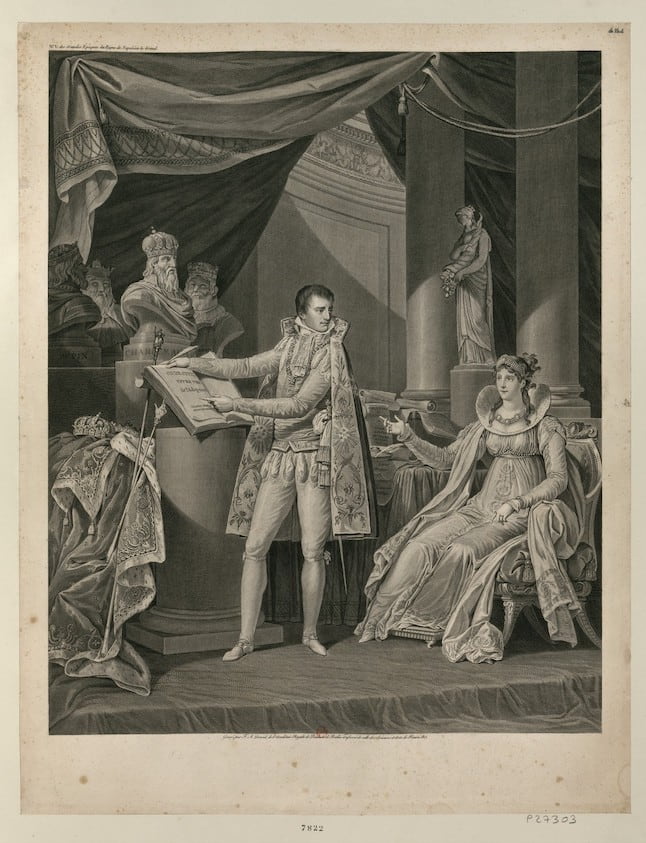Fascinated by Gallo-Roman history? Click Here to download > > > Here are 6 ways Rome affected France
- Home ›
- Ze French ›
- Daily Life in France ›
- Weird French Laws
19 Weird French Laws Thought bizarre even in france
Published 05 September 2023 by Leyla Alyanak
Weird French laws aren't a fairy tale - they DO exist!
Every country has its collection of strange laws but some weird French laws really should be struck off the books: they’re too ancient, too old-fashioned, or simply too stupid.
Some weird laws in France actually still make sense, despite their age, and it’s easy to see how or why their application might make life a little easier.
Others can be frustrating, like the one about frogs (#10 below).
And yet others will simply make you laugh at their implausibility.
But they're all... very French.
 Emperor Napoleon shows off his brand new code to Empress Josephine (Engraving by François-Anne David)
Emperor Napoleon shows off his brand new code to Empress Josephine (Engraving by François-Anne David)Many laws contained in the Civil Code, also known as the Napoleonic Code, date back to Napoleon Bonaparte, who died more than 200 years ago.
I’m not a lawyer and I can’t vouch for the existence or validity of these laws beyond the references I’ve added, should you doubt my word. Beware, though, these references are from French government websites and are, of course, in French. Sorry about that, but in this case, it’s French or nothing… I don’t expect you to read them, but they’re there to prove my point.
Weird French laws that time forgot
- 1. It is forbidden to speak anything other than French in France
- 2. You can marry your first cousin
- 3. No kissing in train stations
- 4. You must always have hay at home
Weird French laws that are just… weird
- 5. You don’t have to be alive to get married
- 6. Go ahead and steal from your family
- 7. You cannot disinherit your kids
- 8. Want to throw your clothes off when you get home? Don’t!
- 9. You cannot name your pig Napoleon
- 10. The frogs in your pond must be quiet
- 11. You can’t have alcohol at work (with a few exceptions)
French laws that may make (some) sense, sometimes
- 12. Your parents can say No to your marriage
- 13. You cannot name your baby Mini-Cooper, Sponge Bob or Ikea
- 14. You cannot spit on the sidewalk
- 15. Nor can you urinate on the street…
- 16. Hungry? Please leave the office
- 17. Ze show must go on
- 18. Want to mow your lawn on Sunday afternoon? That’s a no-no
- 19. Then there's the case of the Eiffel Tower at night
- And a multitude of unusual laws in every sphere of life
Weird French laws that time forgot
Time may have forgotten these laws, but perhaps it should make an effort to remember: they can be stuffy, antiquated, ridiculous, or simply useless.
Are they valid or are they just stupid French laws? Whatever we think, I’m sure some lawyer or bureaucrat somewhere would be quick to tell us just how essential these might be.
1. It is forbidden to speak anything other than French in France
This refers to the oldest law in France, the Edict of Villers-Cotterêts, issued by King François I in 1539. The law was wide-ranging, dealing with everything from justice to centralization. All its provisions have been superseded – except Articles 110-111, which replace the then lingua franca, Latin, with French.
However well-meaning the law, it only applied to the elite in France, especially useful in disseminating administrative documents. As for the general population, it would take a while longer to abandon their Occitan or their Provençal…
These two articles remain in effect today and still used by the Cour de Cassation (France's highest court). French habits die hard.
 King François I, a few years before issuing the Villers-Cotterêts decree
King François I, a few years before issuing the Villers-Cotterêts decree2. You can marry your first cousin
In many countries, first cousin marriages would be considered incestuous. Not in France.
Here’s who you CAN’T marry in France:
- Your father, mother, child, grand-parent, grand-child
- Your brother or sister
- Your half-brother or half-sister
- Your uncle, aunt, niece or nephew
Do you see “first cousin” anywhere? No you don’t. It’s not there.
But what if you desperately want to marry your aunt or grand-father?
You can, under certain circumstances, but the President of France must first authorize it. What I haven’t been able to find out are what those “certain circumstances” are… (Article 164 of the Civil Code)
3. No kissing in train stations
It would appear (I haven’t been able to find this one) that a 1910 law forbids you from French kissing in a French train station.
Why?
It might delay the train.
4. You must always have hay at home
Of course, should the King come by… he’ll need some for his horses. I haven’t found a legal reference for this outdated law either, but others swear it exists. I could easily believe it existed, once upon a time.
 Haystacks - convenient if you must always have some hay at home. Painting by Léon Augustin Lhermitte
Haystacks - convenient if you must always have some hay at home. Painting by Léon Augustin LhermitteWeird French laws that are just… weird
5. You don’t have to be alive to get married
This is truly one of those strange French laws and seems to apply only if the dead person had the intention of marrying you in the first place.
There’s a hitch, though: the President of France has to give his OK.
Here’s how Article 171 of the Civil Code lays it out. Say you were about to get married but your future spouse died before you had a chance to tie the knot. What then?
Well, if the President agrees, the surviving spouse can still get married, and the marriage will be dated the day before his or her death. I’m not quite sure how the ceremony would unfold… In truth, you can count a handful of posthumous marriages in recent years.
6. Go ahead and steal from your family
Here's some unexpected legal ground: you won’t be punished for your theft, because they cannot file a complaint against you.
Sounds ridiculous, right? I have no idea what’s behind this one, but it’s true. According to Article 311-12 of the French Penal Code, you can’t press charges against family members for theft.
But of course, there are exceptions, for example, if those documents are essential, like a passport or identity papers. Your brother steals those? Head straight for the police station.
7. You cannot disinherit your kids
If you’ve had a fight and haven’t spoken to your child for years, no matter, the law is clear: your son or daughter still inherits (the amounts are fixed by law).
A number of articles in the Civil Code deal with this and French inheritance law is complex. Bottom line – everyone gets an equal share.
There is a major exception: if your child commits murder or manslaughter, or criminally contributes to someone’s death, he or she can be categorized as “indigne”, or unworthy, and excluded from your will. The remaining assets are then redistributed equally.
Family ties are strong here.
 No matter how many children you have or how well you get along with them, in France they will inherit their share
No matter how many children you have or how well you get along with them, in France they will inherit their share8. Want to throw your clothes off when you get home? Don’t!
Careful. You could be fined up to 15,000 and spend up to a year in jail − at least that’s the case if there’s a chance someone might see you. And double it if a minor might see you.
Article 222-32 of the Penal Code deals with exhibitionism and sexual harassment, and prohibits you from being naked inside your own home if there’s a chance someone might see you.
There are plenty of shades of gray surrounding this law and heaps of exceptions, nonetheless, you can be stepping naked out of your shower and if someone sees you, they could press charges.
Talk about time to buy those blackout curtains!
9. You cannot name your pig Napoleon
This funny law is a classic, and is often the first quoted of the strange French laws still in existence. It would have been designed to respect the Emperor’s image, way back when.
Except for one thing.
No one can find any legal source for it. It may have existed. It may not have.
So if you really really want to name your cochon Napoléon, you might just get away with it.
10. The frogs in your pond must be quiet
This is an intriguing one, as I have a pond full of loud frogs for several weeks in summer.
According to what has got to be one of the weirdest French laws, if the frogs make too much noise, the neighbors can complain. If they win, they can have your pond sealed or destroyed.

But this creates a bit of a legal conundrum. What happens to the frogs?
You see, in France, frogs are a protected species
According to Article L415-3 of the Environmental Code, anyone who damages these protected species or their environment can be fined up to € 150,000 (USD 162,000) and punished with three years in jail.
Hmmm.
11. You can’t have alcohol at work (except for wine, beer, cider and pear brandy)
If you’ve ever been to a French work cafeteria, you might remember your surprise at seeing small bottles of wine and beer right next to Coke and bottled water. While this is a disappearing habit, it’s perfectly legal.
But to be on the safe side, Article R4228-20 of the Labor Code does have a provision banning even these drinks when employee health is threatened or if the company’s internal rules forbid alcohol. The law doesn’t say you have to sell these drinks at work – it just says you can.
French laws that may make (some) sense, sometimes
Not every weird French law is impossibly hopeless, and you can see the thinking behind some of them even today. Whether you agree or not, though, that’s a different story.
Here, then, are some laws whose rationale you might glimpse (if you look hard enough!)
12. Your parents can say No to your marriage
Yes, even with adult children. You can thank Napoleon, yet again.
According to Article 173 of the Civil Code, parents can oppose marriage of their children. Grandparents can do the same, so make sure you get that prior permission.
Of course this can’t be simply because they don’t like your future husband… there has to be a good reason, and these include the discovery of bigamy, the absence of consent, or forced marriage.

13. You cannot name your baby Mini-Cooper, Sponge Bob or Ikea
According to Article 57 of the Civil Code, if the name you’ve chosen might go against the child’s rights or wellbeing, the Registry Official can let the Justice Ministry know, who can then refer the case to Family Court.
If the name is judged against the child’s interest, the judge can ask the parents to come up with something more sensible, or change it himself.
So don’t try to be too original… or your excess of originality may be punished with the most banal of names.
14. You cannot spit on the sidewalk
This is a bit of an oldie and was adopted by the Vichy government in 1942, at a time of widespread tuberculosis. The law appears to still be on the books, although it is virtually unenforceable.
If anything, has been strengthened. In 2016, the prohibition was extended from the sidewalk and “public space” to public transportation. And with the arrival of the Covid pandemic, fines were tripled for public health reasons.
No spitting on the bus, please!
15. Nor can you urinate on the street…
Although someone forgot to tell French men.
16. Hungry? Please leave the office
That’s right, it’s illegal to eat in your office or factory (unless a Labor Inspector says it’s all right).
Article R4228-19 of the Labor Code wants to make sure you leave your desk at lunchtime. Remember, the French have the longest lunch hours and with France’s gastronomic meal now protected by UNESCO, lunch is no laughing matter.
17. Ze show must go on
As with a similar law in Quebec to safeguard French culture, France has a cap on foreign music. A 1994 law, called the Loi Toubon after the minister who enacted it, set a French music quota forced French radio stations to make sure at least 40% of the music they aired was French. The move, combined with French copyright law, has been a creative stimulus for French artists.
Controversial when it was passed in, Law 94-665, as it is also known, now enjoys widespread support.
Its reach goes far beyond music. By favoring French over English creep, it has made sure all basic information is available in French, from work contracts with foreign multinationals to French language instruction manuals.
18. Want to mow your lawn on Sunday afternoon? That’s a no-no
This one is familiar to me, because the rules are relatively strictly enforced where I live, at least for everyday citizens (farmers can reap at any hour).
Sunday mornings, on the other hand, are fair game, which seems a little counterintuitive. After all, isn’t Sunday morning a day to sleep in? Do you really want your sleep shattered by a lawnmower?
According to France’s National Noise Council, you can go ahead and run your drill or mix your cement at very specific hours in the morning and afternoon from Monday to Saturday, and on Sundays and holidays, mornings only.
 Sorry, not on Sunday afternoon!
Sorry, not on Sunday afternoon!19. Then there's the case of the Eiffel Tower at night
It’s true, but it’s rarely enforced: those 20,000 glittering night lights are considered art, and as such, are protected by copyright. Legally, you need permission to publish photos of the Eiffel Tower at night.
In practice, the Eiffel police would be kept awfully busy if enforced.
But if you want to take pictures to show your family back home, then snap away!
And a multitude of unusual laws in every sphere of life
I haven't found references for these, but I'm assured they exist. They certainly sound as though they could!
- A ban on ketchup in school cafeterias in line with healthy eating
- You cannot photograph police vehicles (but you can photograph police at work, for editorial reasons) or disseminate the photos on social media (I've found conflicting references for this particular one so take it with a grain of salt)
- Religious laws, which cover everything from Christian veils to burkini bans (all these are constantly in the news)
Unusual French laws for special or local circumstances
Sometimes, a mayor or local or regional authority might pass a law which applies to its own community but would make little sense beyond. Here are a few of those…
- Several towns scattered across France have made it illegal to die in town. There simply isn’t enough room in the local cemetery.
- UFOs are banned in Chateauneuf-du-Pape, known more for its wine than its aliens. This stems from a 1954 sighting which prompted the then mayor to forbid flying saucers from landing within the town limits or face immediate confiscation. Clearly it worked, and not a single flying saucer has landed in town in all those years.
- Since 1999, the town of Sainte-Gemmes-sur-Loire in northern France near Nantes has set aside free parking for Santa’s reindeer. This law is still in effect.
- Following local and town hall complaints, the mayor of Briollay in the Loire Valley has forbidden mosquitoes on its territory. So far, no one has informed the mosquitoes.
- I love this one: the southwestern town of Essarts-en-Bocage, in an effort to promote its “Joyous Town” festival, has passed a law compelling citizens to be in a good mood between 8am and 10pm every day, and to make at least 10 people smile the week of the festival.
- French railway rules charge domesticated animals for the ride, and each requires its own ticket. Including snails, apparently. What isn't clear is whether each snail requires an individual ticket or if it's one ticket for the entire cluster.
- And there are plenty more… like the beach town that banned sandcastles!
Clearly, the weird laws list isn’t going anywhere soon.
Repealed at last!
Clearly, France has its fair share of weird laws. The good news is that some of them are being repealed.
For example, a 200-year-old law forbidding women to wear trousers in Paris was on the books as late as 2013, although exceptions would be made in certain circumstances, for example when riding a horse. Women's rights and gender equality can be slow.
And potatoes were apparently illegal in France during the 18th century, as they were believed to be poisonous and to carry disease.
Thankfully for French Fries and fashion, legislators saw the light.
Efforts have been afoot to sweep away obsolete or ridiculous laws, some of which have been around for centuries and need a dust-off. The commission created to undertake this work has a rather unfortunate acronym… BALAI, which means broom in French.
And there’s a principle in France whereby ignorance is no excuse for breaking the law.
So if you happen to have run out of hay at home or unwittingly stepped out of the shower soaking wet and naked, you can still be punished.
Just don’t fret. The police have better things to do!
Before you go...
France is incredibly idiosyncratic (some just say weird!) but we take pride in that originality. If you're curious about this more offbeat side of France, read this article about our strange culinary habits...
Did you enjoy this article? I'd love if you shared it!
 |
 |

